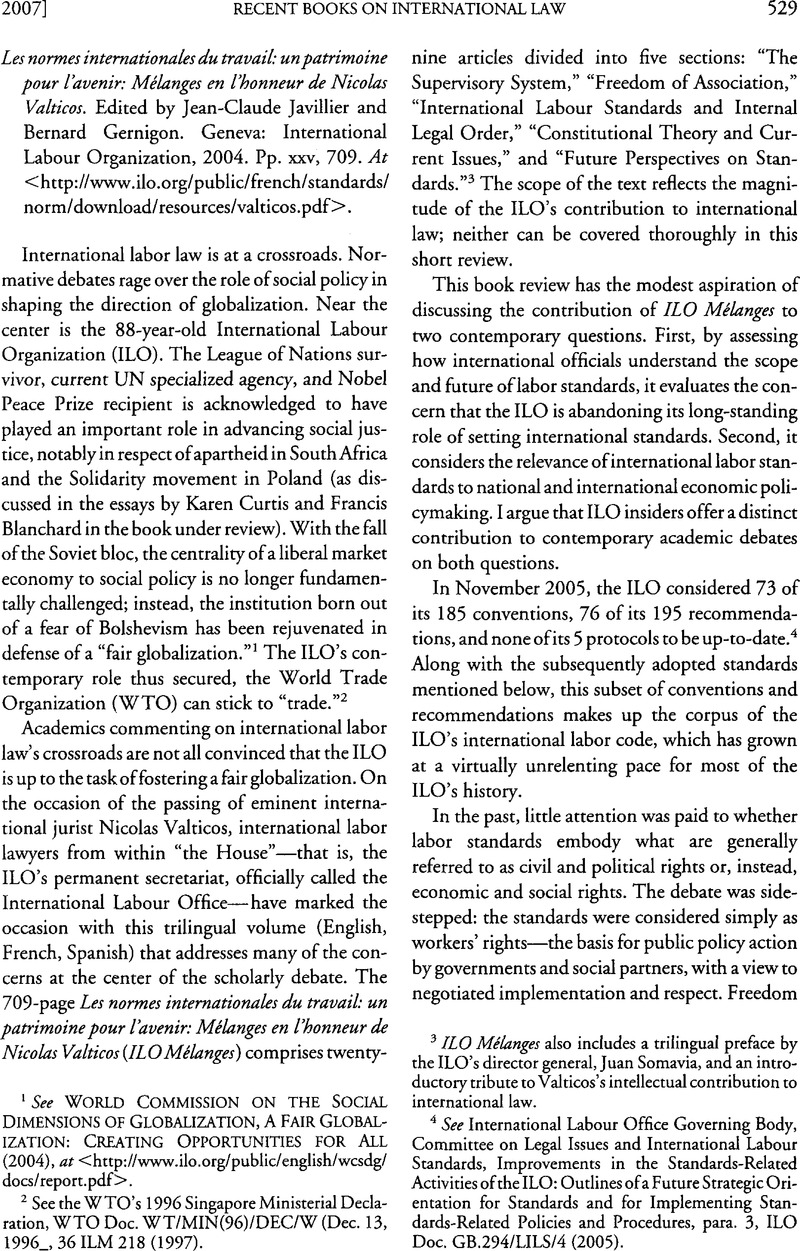No CrossRef data available.
Article contents
Les normes internationales du travail: un patrimoine pour I’avenir: Mélanges en I’honneur de Nicolas Valticos. Edited by Jean-Claude Javillier and Bernard Gernigon. Geneva: International Labour Organization, 2004. Pp. xxv, 709. At <http://www.ilo.org/public/french/standards/norm/download/resources/valticos.pdf>=.
Published online by Cambridge University Press: 27 February 2017
Abstract

- Type
- Recent Books on International Law
- Information
- Copyright
- Copyright © American Society of International Law 2007
References
1 See World Commission on The Social Dimensions of Globalization, A Fair Globalization: Creating Opportunities for All (2004), at <http://www.ilo.org/public/english/wcsdg/docs/report.pdf=.Google Scholar
2 See the WTO’s 1996 Singapore Ministerial Declaration, WTO Doc. WT/MIN(96)/DEC/W (Dec. 13, 1996_, 36 ILM 218 (1997).
3 ILO Mélanges also includes a trilingual preface by the ILO’s director general, Juan Somavia, and an introductory tribute to Valticos’s intellectual contribution to international law.
4 See International Labour Office Governing Body, Committee on Legal Issues and International Labour Standards, Improvements in the Standards-Related Activities of the ILO: Outlines of a Future Strategic Orientation for Standards and for Implementing Standards- Related Policies and Procedures, para. 3, ILO Doc. GB.294/LILS/4 (2005).
5 How Nations Behave: Law and Foreign Policy 47 (2d ed. 1979).
7 See also the contributions by J. Ricardo Hernández Pulida, Jean-Michel Servais, and Katerina Tsotroudi in this volume.
8 Economist John Williamson attached the label “Washington Consensus” to a set of policies promoting growth and development on the basis of privatization, trade, and investment liberalization, as well as tight fiscal and monetary discipline. The label underscores the critical role that the U.S. Treasury Department and the Washington-based and heavily U.S.-funded Bretton Woods institutions played in developing these policies. See John, Williamson, What Washington Means by Policy Reform, in Latin American Adjustment: How Much Has Happened? 7 (John, Williamson ed., 1990)Google Scholar; see also John, Williamson, The Washington Consensus Revisited, in Economic and Social Development in the XXI Century 48 (Louis, Emmerij ed., 1997).Google Scholar For a prominent critique of the Washington Consensus, see Nancy, Birdsall & Augusto de la, Torre, Washington Contentious: Economic Policies for Social Equity in Latin America (2001).Google Scholar
9 This point is developed in helpful detail in Kerry Rittich, “Core Labor Rights and Labor Market Flexibility: Two Paths Entwined?” in Labor Law Beyond Borders: Adrand the Internationalization of Labor Dispute Settlement 157 (International Bureau of the Permanent Court of Arbitration ed., 2003).Google Scholar
10 Jean-Michel, Servais, Globalization and Decent Work Policy: Reflections upon a New Legal Approach, 143 Int’l Lab. Rev. 185, 185 (2004)Google Scholar.




